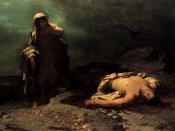Daughter and sister of her father, Oedipus, Antigone's life was doomed from the start. Antigone accompanied her father into exile but returned to Thebes after his death. Oedipus left the throne of Thebes to his sons, Eteocles and Polynices, Antigone's brothers. The two came into conflict over who should rule, and after Eteocles succeeded in establishing himself in power, Polynices led the expedition of the Seven Against Thebes to unseat his brother. In the course of the siege, Eteocles and Polynices killed each other. The new king, Creon, gave Eteocles an honorable burial but ordered that the body of Polynices, whom he regarded as a traitor, remain where it had fallen. Antigone, believing divine law must take precedence over earthly decrees, buried her brother. Creon condemned her to be buried alive. She hanged herself in the tomb, and her grief-stricken lover, Haemon, Creon's son, killed himself.
He later reverses his order, having realized that obedience to the gods and loyalty to family come before obedience to the state, but it is too late: Antigone, Creon's son (who loves Antigone), and Creon's wife have all killed themselves.
Shocks of reversal, recognition, and suffering cause the seemingly virtuous, yet flawed, hero to come to a point of discovery and loss. In this case, the protagonist's final agony or painful end was Creon's loss of his family resulting from his defiance of divine law. For Aristotle, tragedy's primary goal had to be therapeutic, stimulating in the viewer an emotional release and purification known as catharsis. Antigone is based around the theme that pain and suffering is caused when an individual, adamantly defying the commands of divine will or other authority, or refusing to accept destiny and serendipity, instead obeys some inner compulsion that leads to agonizing...


